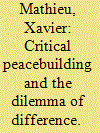| Srl | Item |
| 1 |
ID:
164029


|
|
|
|
|
| Summary/Abstract |
Recent research has revealed the need to include and understand local actors in order to improve the effectiveness of peacebuilding. According to these analyses, peacebuilding could become more respectful of cultural differences thanks to a genuine engagement with the specificities of the local. Empirical studies of the ‘different’ local have thus flourished in the field with the ambition of countering the universalist tendency of traditional peacebuilding. Through the use of the concept of ‘dilemma of difference’, this article challenges this intuitive argument and argues that these approaches risk reproducing a stigma attached to the ‘different’ local. Indeed, emphasising difference in order to ensure its respect means separating and reifying ‘it’ as a deviation from the norm(al). As such, this analytical strategy is likely to recreate the stigma that contributed to the exclusion of local actors in previous peacebuilding practice and research. In contrast, I outline three strategies for studying difference differently in peacebuilding: focusing on the institutional arrangements that enabled specific differences to emerge and become visible; recognising that these differences are internal to peacebuilding (and thus an unlikely source of alternative and emancipation); and revealing the unstated and implicit Self for/from whom local difference is relevant.
|
|
|
|
|
|
|
|
|
|
|
|
|
|
|
|
| 2 |
ID:
165125


|
|
|
|
|
| Summary/Abstract |
Interventions such as courts and truth commissions are elements of an internationally established transitional justice (TJ) toolkit. Such measures are rarely sustainable or in place after the occurrence of mass violence. Those affected then have to themselves get active to restore social relationships. Civil society plays an important role in these transitions, but civil society also needs to be scrutinised to deconstruct reductionist conceptualisations in TJ discourses. Taking the Moluccan conflict and peace process as a case study, this paper looks into alternative ways that communities seek to transition from violence to peace and in the process ask for forms of justice not exclusively related to physical violence. Instead, communities focus on continuing social injustices that they believe underlie this violence. Analysis of the case study promotes an understanding of TJ not primarily as transitional, but as transformative and performative. In this way locally driven transitional justice mechanisms look not only into the past and legacies of violence, but also into legacies of harmony and peace and the emergence of integrative means in the future. The case study shows that forms of art in Maluku were turned into a force that aimed to reintegrate society divided by violence and unite society to resist exploitation and suppression by outside forces. Young people played important roles in this dynamic. The search for reconciliation in Maluku was in this way transformed into a broader struggle against structural violence and destructive outside interventions and for social justice and sustainable peace.
|
|
|
|
|
|
|
|
|
|
|
|
|
|
|
|